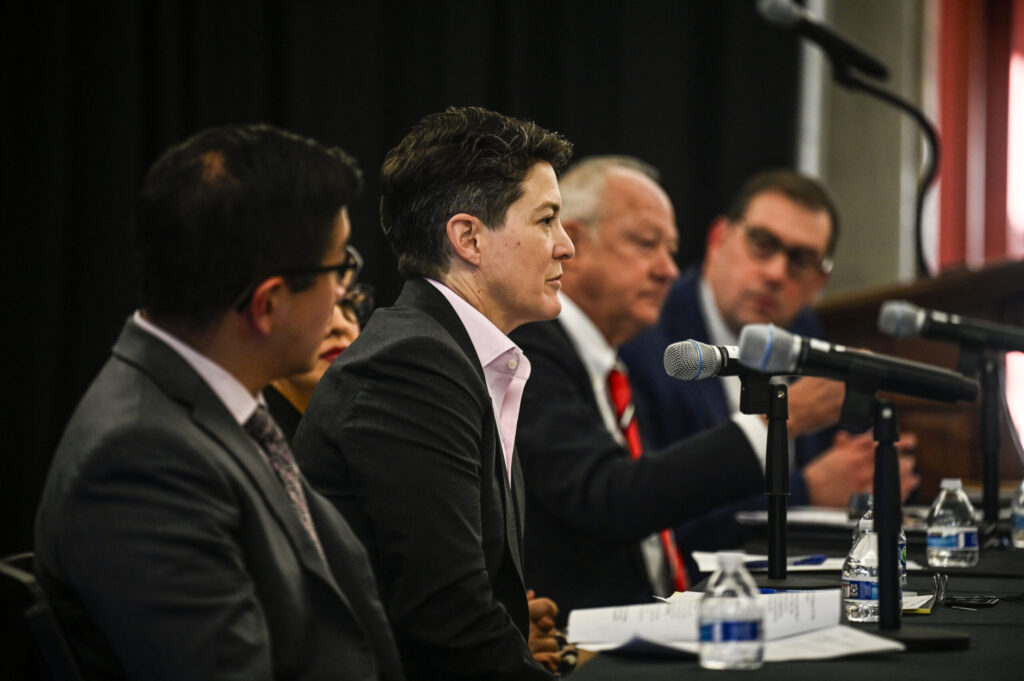Colorado Supreme Court says license plate corresponding to other vehicle is grounds for stopping driver
An Adams County deputy’s discovery that the license plates on a vehicle were registered to another car provided him the reasonable suspicion required to detain the driver, the Colorado Supreme Court ruled on Monday.
However, the justices stopped short of deeming the subsequent vehicle search constitutional, as the trial judge had not yet evaluated whether law enforcement found drug paraphernalia before or after they started searching the defendant’s car.
A sheriff’s deputy spotted Travis Roland Barnett and a passenger sitting in a motel parking lot in a 2002 Yukon SUV. The occupants allegedly drew the deputy’s attention because they “looked the other way” when he saw them. The deputy looked up the SUV’s license plates and learned they were registered to another vehicle.
The deputy believed he could not cite Barnett for the misuse of plates because the Yukon was on private property, but he and another deputy activated their lights and contacted the occupants.
Barnett said he had just bought the car and possessed the bill of sale and the title. Nonetheless, the deputies ordered the occupants out of the car for a pat-down search.
At some point, the deputies spotted a suspected methamphetamine pipe on the floorboard. They searched the Yukon and found bags of meth. Prosecutors subsequently charged Barnett with a drug felony and two misdemeanors. The SUV was never reported as stolen.

The defense moved to exclude the drug evidence from trial for an alleged violation of Barnett’s Fourth Amendment right against unreasonable searches and seizures.
At a hearing, the deputy testified he had a “feeling” and a “hunch” about potential criminal activity. He testified the motel area had a “high crime rate” and the Yukon was a vehicle model that was frequently stolen, leading to reasonable suspicion of an offense.
District Court Judge Jeffrey D. Ruff agreed with Barnett that the parking lot detention was unreasonable. He believed there was no basis for law enforcement to arrest Barnett based on the mismatched plates alone, nor did the deputies have grounds to order Barnett and his passenger out of the Yukon for a pat-down search.
Although police can seize evidence of a crime without a warrant if it is in plain view, Ruff believed the prosecution had not established the meth pipe was in plain view on the floorboard prior to Barnett and his passenger being ordered outside.
“To suggest otherwise, would allow peace officers to remove people from their cars, when there is no reasonable belief that a defendant is armed and dangerous, for the mere purpose of getting a better look at the contents of the car,” he wrote. “This practice would subject people contacted for traffic violations to having their personal space and safety infringed upon, and their cars open to ‘plain-view’ searches of items that were not otherwise in plain-view.”

The Adams County Justice Center
The district attorney’s office immediately appealed to the Supreme Court, arguing the deputy had reasonable suspicion of vehicle theft at the time he detained Barnett. Moreover, even if the deputies did not have grounds to pat down Barnett, they were within their rights to order the occupants out of the Yukon during the detention.
Barnett countered there are “many innocent reasons” for mismatched license plates, including the one that applied to Barnett: that he recently bought the vehicle.
“Following the government’s logic, law enforcement would have cart-blanche (sic) to presume that any one of these vehicles might be stolen, and intrude upon the personal security of their owners without any report or evidence that these cars had actually been stolen,” wrote public defender James Beck.
The Supreme Court, however, agreed with the prosecution that the license plate discrepancy supplied reasonable suspicion of a potentially stolen vehicle.
Justice Brian D. Boatright, in the court’s Dec. 9 opinion, acknowledged there were no grounds to pat down Barnett, which requires a belief that the suspect is armed and dangerous.
“By contrast, orders to exit a vehicle during an investigatory stop do not constitute an additional seizure and thus do not require a deputy to reasonably believe that the passengers are armed and dangerous,” he wrote.
Even though the court upheld the legality of the stop and the order for Barnett to exit the vehicle, the justices did not ultimately rule on the constitutionality of the search. The vehicle search was prompted by the meth pipe being in plain view, but it was unclear whether the object was visible on the floorboard before the search began.
“Was it in plain view when Barnett and his passenger left the vehicle? Or did the deputies’ search of the vehicle reveal the pipe? If the latter, at what point in the search did the pipe emerge?” wrote Boatright. “How the deputies discovered the pipe impacts the legality of the search.”
The court returned the case to Ruff to revisit his analysis of the meth pipe.
The case is People v. Barnett.











